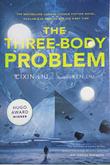Chinese science fiction author Cixin Liu’s Remembrance of Earth’s Past trilogy is, at its heart, the story of an alien invasion. However, it’s very different from something like Independence Day; by the end of the trilogy’s Hugo Award–winning first volume, The Three-Body Problem (2014), translated by acclaimed American SF author Ken Liu (no relation to Cixin), there are no flying saucers blowing up the White House—at least, not yet. Still, there are more than enough fascinating concepts to keep readers riveted, and this applies equally to the first season of 3 Body Problem, a new, streamlined adaptation created by Game of Thrones’ David Benioff and D.B. Weiss along with The Terror’s Alexander Woo. It premieres on Netflix March 21.
Both the book and the series begin in China in the 1960s, as young physicist Ye Wenjie watches Red Guards murder her father, a physics professor. Soon, she’s assigned to a secret government facility whose aim is to detect signals from extraterrestrials; she clandestinely finds a way to amplify the facility’s communication signal and makes contact with what appears to be a member of an alien civilization. Her subsequent actions have devastating effects that will be felt decades later, as Chinese investigator Shi Qiang and nanotechnologist Wang Miao look into the strange deaths of several scientists, including Ye’s physicist daughter, who committed suicide. It’s also revealed that particle accelerator experiments worldwide are yielding random results, seeming to indicate that the very laws of physics are breaking down.
Wang starts experiencing weird hallucinations, including numbers on his field of vision that may be counting down; he later discovers a virtual reality game called Three-Body and begins playing it. The game takes place on a planet that undergoes cataclysmic eras of extreme heat and cold, and Wang eventually figures out what’s causing the climate shifts—an insight that refers to the complex, titular three-body problem of physics. Soon, he becomes involved in a secret organization that has a connection to the beings that Ye contacted years earlier. It all leads to what Kirkus’ reviewer called “jaw-dropping revelations” that “build to a stunning conclusion.”
 Liu packs a lot of big ideas into this tale of slow-motion invasion; later scenes involve weaponized nanofibers and 11-dimensional technology. These might represent a next-level challenge for anyone adapting the material for the screen, but Benioff, Weiss, and Woo rise to the challenge. They do so, in part, by expanding and diversifying the cast. Various aspects of Wang’s story are taken up by a group of young scientists and friends, all alumni of Oxford University, played by Inked’s Jess Hong, Bloodshot’s Eiza González, The Stand’s Jovan Adepo, The Sunlit Night’s Alex Sharp, and Game of Thrones’ John Bradley. All are likable and convincing, as is Doctor Strange’s Benedict Wong as dogged investigator Shi, and they help make the explanations of complex scientific concepts easy to grasp. The true stars of the show, though, are Zine Tseng and Star Trek: Deep Space Nine’s Rosalind Chao as the younger and older versions of Ye Wenjie; they both offer affecting performances that provide the show with its emotional center.
Liu packs a lot of big ideas into this tale of slow-motion invasion; later scenes involve weaponized nanofibers and 11-dimensional technology. These might represent a next-level challenge for anyone adapting the material for the screen, but Benioff, Weiss, and Woo rise to the challenge. They do so, in part, by expanding and diversifying the cast. Various aspects of Wang’s story are taken up by a group of young scientists and friends, all alumni of Oxford University, played by Inked’s Jess Hong, Bloodshot’s Eiza González, The Stand’s Jovan Adepo, The Sunlit Night’s Alex Sharp, and Game of Thrones’ John Bradley. All are likable and convincing, as is Doctor Strange’s Benedict Wong as dogged investigator Shi, and they help make the explanations of complex scientific concepts easy to grasp. The true stars of the show, though, are Zine Tseng and Star Trek: Deep Space Nine’s Rosalind Chao as the younger and older versions of Ye Wenjie; they both offer affecting performances that provide the show with its emotional center.
At its best, 3 Body Problem—with its diverse ensemble cast, complex mysteries, secret organizations, and apocalyptic stakes—recalls such compulsively watchable shows as Lost. The series steadily doles out shocking revelations and ratchets up the tension until the fifth episode, which features not one, but two climactic set pieces, both stunning. If things had ended there—roughly where the book ends—it would be a nearly flawless season of television. Unfortunately, the final three episodes, which set up plot elements of later volumes of Liu’s trilogy, are far less compelling; the tension evaporates, and the narrative simply sputters to a stop. It’s an ending that will certainly divide the show’s fans (a situation that also brings Lost to mind). Let’s hope that in future seasons the creators remember to keep shooting for the stars.
David Rapp is the senior Indie editor.
CORRECTION: A previous version of this story misidentified the actor John Bradley.



































